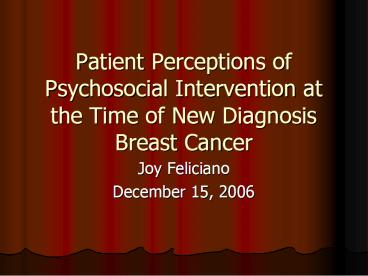Patient Perceptions of Psychosocial Intervention at the Time of New Diagnosis Breast Cancer - PowerPoint PPT Presentation
1 / 20
Title:
Patient Perceptions of Psychosocial Intervention at the Time of New Diagnosis Breast Cancer
Description:
28 year old female of Ashkenazi Jewish decent was seen in ... 2.Avis, N., Crawford, S., Manuel, J. Quality of Life Among Younger Women With Breast Cancer. ... – PowerPoint PPT presentation
Number of Views:186
Avg rating:3.0/5.0
Title: Patient Perceptions of Psychosocial Intervention at the Time of New Diagnosis Breast Cancer
1
Patient Perceptions of Psychosocial Intervention
at the Time of New Diagnosis Breast Cancer
- Joy Feliciano
- December 15, 2006
2
Case scenario
- 28 year old female of Ashkenazi Jewish decent was
seen in clinic to discuss further medical
management for newly diagnosed bilateral
multicentric breast cancer s/p bilateral
mastectomy. - She was tearful throughout the entire interview
and repeatedly said, you must think Im crazy.
She also reported poor appetite, difficulty
sleeping, and erratic moods.
3
- After medical treatment was discussed, the idea
of seeing a counselor or psychologist was
approached to help talk about adjusting to her
diagnosis. - Her initial response was, I dont need that,
Im not crazy.
4
Why this topic?
- In the United States, breast cancer is the most
commonly diagnosed malignancy in women, affecting
approximately 215,000 new women each year.¹ - Over the last two decades, breast cancer 5 year
survival rates have improved from approximately
75 to now, over 87.¹
5
Why this topic?
- Still, over 40,000 women are expected to die from
breast cancer this year.1 - The diagnosis of breast cancer and treatment of
breast cancer is still associated with many side
effects and effects on a patients health related
quality of life.¹
6
What can I gain from this as an Internist?
- Are barriers unique to cancer patients?
- We have our own perceptions and barriers.
- Holistic approach to the care of the patient
7
What are the effects on Quality of Life
- Physical consequences and symptoms
- Sexual and interpersonal complications
- Emotional and psychosocial complications
8
Why should we address quality of life?
- Improves communication
- Patient satisfaction
- Better patient care
9
Physical complications
- Generalized aches and pains ²
- Fatigue
- Nausea
- Lymphedema
- Difficulty with bladder control 2
- Dyspareunia 2
- Hot flashes 2
- Early Menopause 2
10
Sexual and Interpersonal complications
- Dyspareunia 2
- Unhappiness with appearance 2
- Difficulty in communicating with partner 3
- Dating Issues 3
- Chemotherapy induced menopause 2,3
11
Emotional and Psychosocial Complications
- Tend to be more immediate as opposed to long
term. - Psychologic distress 4
- Anxiety in medical situations 4
- Worry about the future 4
- At risk patients appear to have longer duration
of consequences 4
12
Interventions for Emotional and Psychosocial
Complications
- Individual psychological support for cancer
patients. - Psychologist vs. trained nurse in multiple types
of cancer found that individual psychological
support is beneficial vs. control. 5 - Patients who participated were satisfied with the
intervention and most reported they would
recommend this to a friend. 5
13
- Group psychotherapy or social support group vs.
control in patients with primary, non-metastatic
breast cancer. - This study of 69 women found that social support
groups were beneficial to women who had minimal
support systems prior to study. 6
14
- Early psychosocial intervention decreases
distress at 12 months in women with early stage
breast cancer compared to delayed psychosocial
intervention. 7
15
- Cognitive behavioral therapy meta-analysis in
breast cancer patients - Meta-analysis of 20 prospective randomized
studies of CBR in cancer patients. - Individually administered cognitive behavioral
techniques appear to be beneficial in the
management of distress and pain in breast cancer
patients.8
16
Possible barriers to pursuing psychosocial
intervention or support5
- Not interested in participating (40 of 202)
- No need for psychosocial interventions (25)
- Distance (11)
- Too ill (8)
- Time constraints (4)
- Previous negative experience with
psychologists(1)
17
Possible barriers contd7
- In the study of early vs. delayed
interventions.. - Not interested (26 / 164)
- Having enough support (26/164)
- Distance / time (27 / 164)
18
Goals of this Survey
- Identify women who are at risk of psychosocial
distress or complications early on in their
diagnosis. - Identify patients perceptions of psychosocial
interventions - Identify barriers to pursuing psychosocial
intervention or support
19
My ultimate goal..
- Attempt to form an intervention to address
patient barriers to pursuing psychosocial
intervention or support.
20
References
- 1.American Cancer Society Cancer Facts and
Figures. Atlanta, GA, American Cancer Society,
2005. - 2.Avis, N., Crawford, S., Manuel, J. Quality of
Life Among Younger Women With Breast Cancer.
Journal of Clinical Oncology. 23 (15) May 20,
2005 - 3.
- 4.Schag, E. et al. Characteristics of Women at
Risk for Psychosocial Distress in the Year After
Breast Cancer. Journal of Clinical Oncology.
11(4) April 1993 - 5.Hellbom, M. et. Al. Individual Psychological
Support for Cancer patients Utilisation and
patient satisfaction. Patient Education and
Counseling 34. - 6.Vos, P. et. Al. Psychosocial Intervention for
Women with Primary, Non-Metastatic Breast Cancer
A Comparison between Participants and
Non-Participants. Psychotherapy and
Psychosomatics. 2004 73 276-285. - 7.Vos, P. ets. Al. Effects of delayed
psychosocial interventions versus early
psychosocial interventions for women with early
stage breast cancer. Patient Education and
Counseling. 60 (2006) 212-219. - 8.Tatrow, K. and Montgomery, G. Cognitive
Behavioral Therapy Techniques for Distress and
Pain in Breast Cancer Patients A Meta-Analysis.
Journal of Behavioral Medicine. 29 (1) 2006.































